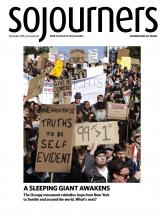High unemployment and declining incomes are changing America so drastically that we’ll soon have a country our grandparents wouldn’t even recognize. And our best and brightest lack the imagination to do anything about it.
Those are the messages, overt and implied, in a recent run of brilliant analytical journalism by Don Peck, an editor at The Atlantic. In March 2010, The Atlantic published Peck’s supremely important, and very long, article “How a New Jobless Era Will Transform America.” September 2011 brought a follow-up, “Can the Middle Class Be Saved?” and the material in both pieces has been expanded into a book, Pinched: How the Great Recession Has Narrowed Our Futures and What We Can Do About It.
In that first Atlantic article, Peck successfully does what almost no one ever does: He pulls together the relationship between economics and culture. On the economics side, he establishes that what we are experiencing today is no ordinary “business cycle” recession, but something more like a slow-motion equivalent to the Great Depression. And he cites studies of previous generations that entered the work force in times of high unemployment to show that the effects of the hard times didn’t wear off, but instead persisted over a lifetime of lower earnings and diminished happiness.
Read the Full Article
